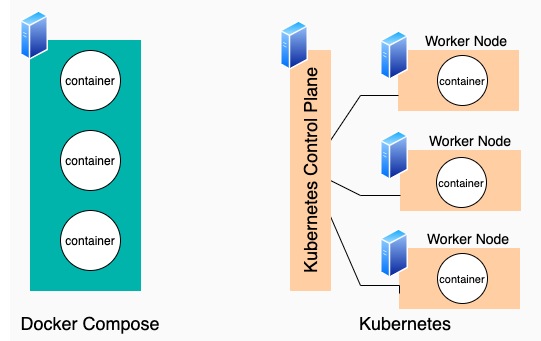
- Difference between docker and kubernetes movie#
- Difference between docker and kubernetes full#
- Difference between docker and kubernetes software#
- Difference between docker and kubernetes code#
- Difference between docker and kubernetes windows#
increase or decrease number of computing resources) to maintain application availability, provide stable application performance, and optimize operational costs as computing demand increases or decreases. To resolve this potentially-devastating issue, NetPly would like to use load-balancing and auto scaling techniques and automatically adjust the resource capacity (e.g.

Issue 2- Viewers experience a lot of lags as well as poor quality and degraded performance for video streams during weekends, nights, and holidays, when incoming requests spike.
Difference between docker and kubernetes code#
Therefore, NetPly would like to keep code and configuration consistent across their development, test, and production environments to reduce the issues arising from application hosting environments. Issue 1- Code that runs perfectly in a development box, sometimes fails on test and/or production environments.
Difference between docker and kubernetes software#
However, NetPly has been struggling with two fundamental issues in their software development lifecycle:

To run their application globally, at scale, and provide quality of service to their customers, NetPly runs 15,000 production servers worldwide and follow agile methodology to deploy new features and bug fixes to the production environment at a fast clip.
Difference between docker and kubernetes movie#
NetPly delivers video streams to your favorite devices and provides personalized movie recommendations to their customers based on their previous activities, such as sharing or rating a movie. NetPly is an online and on-demand entertainment movie streaming company with 30 million members in over 100 countries. Let’s use a made-up company, NetPly (sounds familiar?), as a case study to highlight the issues we are addressing. By the end of this article, you’ll understand that the choice is not Docker vs Kubernetes, but Kubernetes vs alternative container orchestrators. This post aims to explain the role of each technology and how each technology helps companies ease their software development tasks. There has been some confusion surrounding Docker and Kubernetes for awhile: “what they are?”, “what they are not?”, “where are they used?”, and “why are both needed?” To address these larger container challenges, substantial number of container orchestration systems, such as Kubernetes and Docker Swarm, have exploded onto the scene shortly after the release of Docker. However, Docker technology alone is not enough to reduce the complexity of managing containerized applications, as software projects get more and more complex and require the use tens of thousands of Docker containers.
Difference between docker and kubernetes windows#
Since its initial release in 2013, Docker has become the most popular container technology worldwide, despite a host of other options, including RKT from CoreOS, LXC, LXD from Canonical, OpenVZ, and Windows Containers. Need for Docker Containers and Container Orchestration Tools Therefore, containerization shined drastically in the recent years because of all these advantages for many software projects of enterprises. This allows containers to operate at an unprecedented scale and maximize the number of applications running on minimum number of servers. Containers are lightweight alternative by taking up less space (MBs) and can be provisioning rapidly (milliseconds) as opposed to VM’s slow boot time (minutes) and more storage space requirements (GBs). On the other hand, containers share the same operating system kernel with collocated containers each one running as isolated processes. virtual machine manager).Įven though virtual machines bring us great deal of advantages such as running different operating systems or versions, VMs can consume a lot of system resources and also take longer boot time. In cloud computing, physical hardware on a bare metal server are virtualized and shared between virtual machines running on a host machine in a data center by the help of hypervisor (i.e.
Difference between docker and kubernetes full#
Virtual machines allow you to run a full copy of an operating system on top of virtualized hardware as if it is a separate machine. The Benefits and Limitations of Virtual Machines Since VMs existed long before containers, you may wonder what the need is for containers and why they have become so popular. At the same time, however, virtual machines (VM) as computing resources have reached their peak use in virtualized data centers. It’s unsurprising then, that container technologies, which make application deployment and management easier for teams of all sizes, have risen dramatically in recent years.

The need to deploy applications from one computing environment to another quickly, easily, and reliably has become a critical part of enterprise’s business requirements and DevOps team’s daily workflow. Docker vs Kubernetes: The Journey from Docker to Kubernetes


 0 kommentar(er)
0 kommentar(er)
